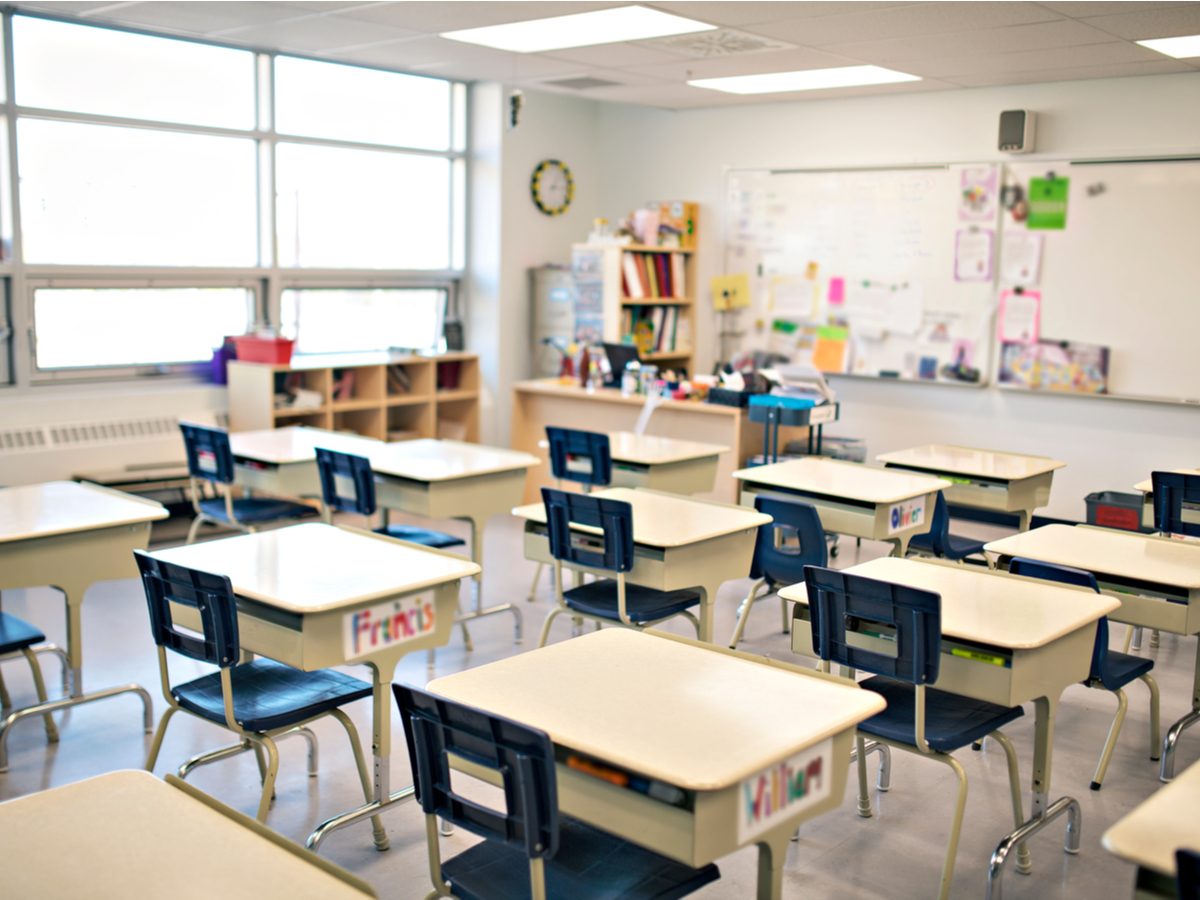Now That Schools Are Reopening, Will I Ever See My Grandkids?
As we near the reopening of schools in Canada, Dr. Isaac Bogoch explains what we can expect—and how to stay as safe as possible.

Ask an expert: How will kids going back to school during the pandemic change things for us once again?
Reader’s Digest Canada: Now that schools are reopening across Canada, will grandparents ever be able to see their grandkids again?
Infectious disease specialist Dr. Isaac Bogoch: Yes, they will. First of all, a vaccine is coming. I don’t know when it will arrive or when we will have the deployment of a vaccine in Canada, but when that happens, and it’s been demonstrated to protect against COVID-19, we’ll be able to shift towards normalcy. There’ll be less concern for people who have grandchildren in school.
Until then, people have to be very careful. We know now that people who are over the age of 60 who get this infection are more likely to have a severe course of illness. And as kids go back to school, it’s important that grandparents make decisions about whether or not they want to get very close to their grandchildren, or hug and kiss them.
Isn’t it just something you shouldn’t do?
Every person will make this decision based on their own unique circumstances. Some people might be living in a part of the country where there’s no COVID-19, or very few cases, and say, “You know what? The risk is extraordinarily small. I’m not going to change my behaviour just yet, but I’m going to watch this because it might change over time.” That’s completely acceptable. Other people’s circumstances might be higher risk, or they might just have a different perception of their risk, and say, “You know what? My grandkids are going back to school and I’m a little nervous about this so I’m going to practice physical distancing with them.” That’s also okay. As long as people are making informed decisions and thinking about it beforehand, then they’re doing something right. There’s not going to be a one-size-fits-all approach to this.
What do we know about how sick kids can get from COVID-19, or whether they’re carriers of the disease?
Children tend to not get as sick with this infection, but it doesn’t mean it can’t happen. In general, most children will have a mild course of the illness—but there will still be the rare event where a child will have a more severe illness.
That said, anyone of any age can get this infection. It doesn’t matter if someone’s a newborn, a hundred years old or anywhere in between. Also, anyone can transmit this infection. What’s still under debate is how efficiently younger individuals transmit it.
Why is that still not known for sure?
A lot of the earlier research was focused on people with severe infection, which tended to be older adults. Kids were just not coming to get medical care because they just weren’t getting that severely ill. Now there’s been a number of different studies on kids who’ve had this infection. Some have shown that children might not be transmitting the virus as easily or as effectively as other age groups. But others show that they can have high levels of virus in their system and are capable of transmitting the infection at the same rate as adults. Personally, I think it’s irrelevant. We should assume that anyone who’s infected can transmit this virus until proven otherwise and take precautions to avoid that from happening.
That’s difficult to do in schools. Do you think the re-opening is going to result in a surge of cases across the country?
I really don’t know. If you look at the provincial plans, they are all integrating fundamental public health principles into the school setting—including some degree of mask wearing in indoor environments, physical distancing, hand sanitation, cleaning of high contact surfaces and retrofitting classrooms for better air circulation. Of course, one of the key things will be how well these are integrated and we know some places are going to adopt these better than others. I don’t think it would come as a surprise to anyone if there was a case of COVID-19 introduced into a school at some point in the fall or winter. And there might even be transmission of this infection in the school. But I just don’t know to what extent that’s going to happen.
You named some of the measures meant to limit spread in schools. What about outdoor classrooms—is that being considered enough?
I do know that some schools are considering that and, while weather permits it, I think it’s a really good approach. From an infectious disease standpoint, being outside is an effective way of preventing the spread of this virus, since transmission of the virus happens overwhelmingly in indoor spaces.
Some re-openings in the United States have gone badly, which is worrisome. Do you think we’re being too impatient in rushing kids back to school?
No, I don’t. School provides so much more than just the education of kids. There’s also tremendous social and psychological development that happen for them there. There’s food security for some kids. If parents have to go to work, they can’t do that if their kids are out of school. There’s so many reasons why school is extremely important.
Of course, we do have to balance that with public safety. You can’t send kids back to school if they’re going to start amplifying COVID-19 at the school, in the home and in their communities. In Canada, sometimes we compare ourselves to the United States and it’s true we’ve seen some high profile outbreaks at schools there. It’s not to say that can’t happen in Canada—it certainly can—but in general, our infection rates are way smaller compared to the United States. So I just don’t think that we’re really comparing apples to apples here.
Circling back to the possibility of a vaccine—when families will be able to reunite without worry—what’s your prognosis on the timing for one?
There’s been tremendous progress on the vaccine front. I think it could be months to a year, but I don’t think it’s years away. It could even arrive in the first part of 2021.
Next, an etiquette expert reveals how to handle social distancing rule breakers.



